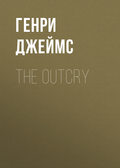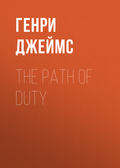
Генри Джеймс
Four Meetings
“Until three weeks ago. And you—you never came back?”
Still looking at me with her fixed smile, she put her hand behind her and opened the door again. “I am not very polite,” she said. “Won’t you come in?”
“I am afraid I incommode you.”
“Oh, no!” she answered, smiling more than ever. And she pushed back the door, with a sign that I should enter.
I went in, following her. She led the way to a small room on the left of the narrow hall, which I supposed to be her parlor, though it was at the back of the house, and we passed the closed door of another apartment which apparently enjoyed a view of the quince-trees. This one looked out upon a small woodshed and two clucking hens. But I thought it very pretty, until I saw that its elegance was of the most frugal kind; after which, presently, I thought it prettier still, for I had never seen faded chintz and old mezzotint engravings, framed in varnished autumn leaves, disposed in so graceful a fashion. Miss Spencer sat down on a very small portion of the sofa, with her hands tightly clasped in her lap. She looked ten years older, and it would have souuded very perverse now to speak of her as pretty. But I thought her so; or at least I thought her touching. She was peculiarly agitated. I tried to appear not to notice it; but suddenly, in the most inconsequent fashion,—it was an irresistible memory of our little friendship at Havre,—I said to her, “I do incommode you. You are distressed.”
She raised her two hands to her face, and for a moment kept it buried in them. Then, taking them away,—“It’s because you remind me—” she said.
“I remind you, you mean, of that miserable day at Havre?”
She shook her head. “It was not miserable. It was delightful.”
“I never was so shocked as when, on going back to your inn the next morning, I found you had set sail again.”
She was silent a moment; and then she said, “Please let us not speak of that.”
“Did you come straight back here?” I asked.
“I was back here just thirty days after I had gone away.”
“And here you have remained ever since?”
“Oh, yes!” she said gently.
“When are you going to Europe again?”
This question seemed brutal; but there was something that irritated me in the softness of her resignation, and I wished to extort from her some expression of impatience.
She fixed her eyes for a moment upon a small sunspot on the carpet; then she got up and lowered the window-blind a little, to obliterate it. Presently, in the same mild voice, answering my question, she said, “Never!”
“I hope your cousin repaid you your money.”
“I don’t care for it now,” she said, looking away from me.
“You don’t care for your money?”
“For going to Europe.”
“Do you mean that you would not go if you could?”
“I can’t—I can’t,” said Caroline Spencer. “It is all over; I never think of it.”
“He never repaid you, then!” I exclaimed.
“Please—please,” she began.
But she stopped; she was looking toward the door. There had been a rustling aud a sound of steps in the hall.
I also looked toward the door, which was open, and now admitted another person, a lady, who paused just within the threshold. Behind her came a young man. The lady looked at me with a good deal of fixedness, long enough for my glance to receive a vivid impression of herself. Then she turned to Caroline Spencer, and, with a smile and a strong foreign accent,—
“Excuse my interruption!” she said. “I knew not you had company, the gentleman came in so quietly.”
With this she directed her eyes toward me again.
She was very strange; yet my first feeling was that I had seen her before. Then I perceived that I had only seen ladies who were very much like her. But I had seen them very far away from Grimwinter, and it was an odd sensation to be seeing her here. Whither was it the sight of her seemed to transport me? To some dusky landing before a shabby Parisian quatrième,—to an open door revealing a greasy antechamber, and to Madame leaning over the banisters, while she holds a faded dressing-gown together and bawls down to the portress to bring up her coffee. Miss Spencer’s visitor was a very large woman, of middle age, with a plump, dead-white face, and hair drawn back a la chinoise. She had a small penetrating eye, and what is called in French an agreeable smile. She wore an old pink cashmere dressing-gown, covered with white embroideries, and, like the figure in my momentary vision, she was holding it together in front with a bare and rounded arm and a plump and deeply dimpled hand.
“It is only to spick about my café,” she said to Miss Spencer, with her agreeable smile. “I should like it served in the garden under the leetle tree.”
The young man behind her had now stepped into the room, and he also stood looking at me. He was a pretty-faced little fellow, with an air of provincial foppishness,—a tiny Adonis of Grimwinter. He had a small pointed nose, a small pointed chin, and, as I observed, the most diminutive feet. He looked at me foolishly, with his mouth open.
“You shall have your coffee,” said Miss Spencer, who had a faint red spot in each of her cheeks.
“It is well!” said the lady in the dressing-gown. “Find your bouk,” she added, turning to the young man.
He gazed vaguely round the room. “My grammar, d ‘ye mean?” he asked, with a helpless intonation.
But the large lady was inspecting me, curiously, and gathering in her dressing-gown with her white arm.
“Find your bouk, my friend,” she repeated.
“My poetry, d ‘ye mean?” said the young man, also staring at me again.
“Never mind your bouk,” said his companion. “To-day we will talk. We will make some conversation. But we must not interrupt. Come;” and she turned away. “Under the leetle tree,” she added, for the benefit of Miss Spencer.
Then she gave me a sort of salutation, and a “Monsieur!” with which she swept away again, followed by the young man.
Caroline Spencer stood there with her eyes fixed upon the ground.
“Who is that?” I asked.
“The Countess, my cousin.”
“And who is the young man?”
“Her pupil, Mr. Mixter.”
This description of the relation between the two persons who had just left the room made me break into a little laugh. Miss Spencer looked at me gravely.
“She gives French lessons; she has lost her fortune.”
“I see,” I said. “She is determined to be a burden to no one. That is very proper.”
Miss Spencer looked down on the ground again, “I must go and get the coffee,” she said.
“Has the lady many pupils?” I asked.
“She has only Mr. Mixter. She gives all her time to him.”
At this I could not laugh, though I smelt provocation; Miss Spencer was too grave. “He pays very well,” she presently added, with simplicity. “He is very rich. He is very kind. He takes the Countess to drive.” And she was turning away.
“You are going for the Countess’s coffee?” I said.
“If you will excuse me a few moments.”
“Is there no one else to do it?”
She looked at me with the softest serenity. “I keep no servants.”
“Can she not wait upon herself?”
“She is not used to that.”
“I see,” said I, as gently as possible. “But before you go, tell me this: who is this lady?”
“I told you about her before—that day. She is the wife of my cousin, whom you saw.”
“The lady who was disowned by her family in consequence of her marriage?”
“Yes; they have never seen her again. They have cast her off.”
“And where is her husband?”
“He is dead.”
“And where is your money?”
The poor girl flinched; there was something too consistent in my questions. “I don’t know,” she said wearily.
But I continued a moment. “On her husband’s death this lady came over here?”
“Yes, she arrived one day.”
“How long ago?”
“Two years.”
“She has been here ever since?”
“Every moment.”
“How does she like it?”
“Not at all.”
“And how do you like it?”
Miss Spencer laid her face in her two hands an instant, as she had done ten minutes before.
Then, quickly, she went to get the Countess’s coffee.
I remained alone in the little parlor; I wanted to see more, to learn more. At the end of five minutes the young man whom Miss Spencer had described as the Countess’s pupil came in. He stood looking at me for a moment with parted lips. I saw he was a very rudimentary young man.
“She wants to know if you won’t come out there,” he observed at last.
“Who wants to know?”
“The Countess. That French lady.”
“She has asked you to bring me?”
“Yes, sir,” said the young man feebly, looking at my six feet of stature.
I went out with him, and we found the Countess sitting under one of the little quince-trees in front of the house. She was drawing a needle through the piece of embroidery which she had taken from the small table. She pointed graciously to the chair beside her, and I seated myself. Mr. Mixter glanced about him, and then sat down in the grass at her feet. He gazed upward, looking with parted lips from the Countess to me. “I am sure you speak French,” said the Countess, fixing her brilliant little eyes upon me.
“I do, madam, after a fashion,” I answered in the lady’s own tongue.
“Voilà!” she cried most expressively. “I knew it so soon as I looked at you. You have been in my poor dear country.”
“A long time.”
“You know Paris?”
“Thoroughly, madam.” And with a certain conscious purpose I let my eyes meet her own.
She presently, hereupon, moved her own and glanced down at Mr. Mixter “What are we talking about?” she demanded of her attentive pupil.
He pulled his knees up, plucked at the grass with his hand, stared, blushed a little. “You are talking French,” said Mr. Mixter.
“La belle découverte!” said the Countess. “Here are ten months,” she explained to me, “that I am giving him lessons. Don’t put yourself out not to say he’s an idiot; he won’t understand you.”
“I hope your other pupils are more gratifying,” I remarked.
“I have no others. They don’t know what French is in this place; they don’t want to know. You may therefore imagine the pleasure it is to me to meet a person who speaks it like yourself.” I replied that my own pleasure was not less; and she went on drawing her stitches through her embroidery, with her little finger curled out. Every few moments she put her eyes close to her work, nearsightedly. I thought her a very disagreeable person; she was coarse, affected, dishonest, and no more a countess than I was a caliph. “Talk to me of Paris,” she went on. “The very name of it gives me an emotion! How long since you were there?”







